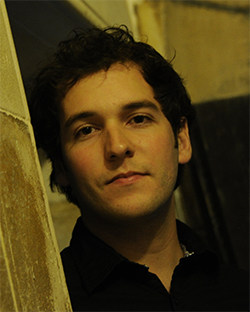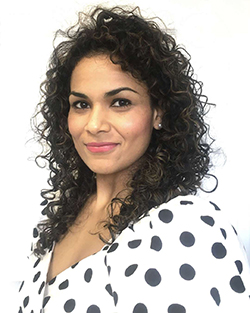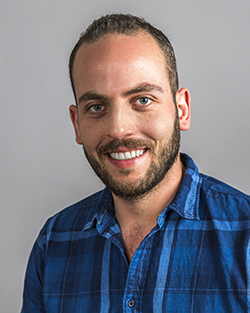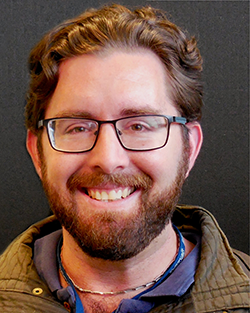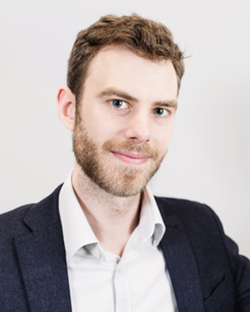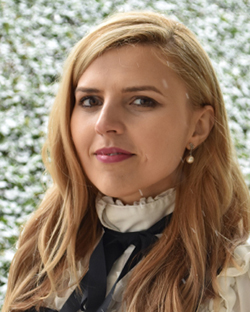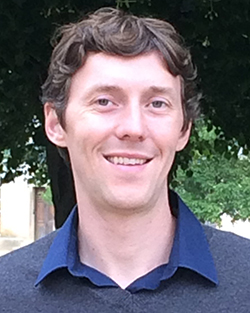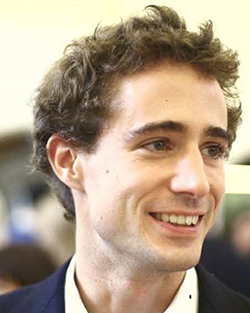|
Dr Paulo Amaral I am a visiting researcher at the Gurdon Institute, in the group of Professor Tony Kouzarides and also currently a research scientist at a drug discovery company called Storm Therapeutics, which is a spin-out of the Gurdon Institute. I trained as a Biochemist (MSc) and Molecular Geneticist (PhD), and my research focuses on the control of the activity of the genome in cancer cells and in organism development. I specialized in dissecting the roles of so-called noncoding DNA and the functions of the plethora of noncoding RNA molecules produced from it. In my present project, I am developing methods to identify enzymatically deposited chemical modifications on RNA molecules, which influence their functions in cancer cells. In addition to teaching and public engagement activities, I initiated a project to apply genomic and in vitro cell biology approaches to tackle problems of major clinical and social relevance, such as drug overdosing and adverse reactions. I am developing this project in partnership with Dr. Dilrini De Silva (CRUK Cambridge Centre), who is also a Borysiewicz Biomedical Fellow. We co-founded Pentail Enzymes Limited and will develop this start-up at the University of Cambridge with the support of the Fellowship, which so far has been instrumental in providing us entrepreneurship and leadership skills, in addition to a strong network of contacts.
|
|
|
Dr Mireia Crispin I am a Research Fellow at Trinity College, University of Cambridge and Cancer Research UK, and one of the 2018 Borysiewicz Fellowships of the University of Cambridge. I co-chair the Computational Group of the Mark Foundation Institute for Integrative Cancer Medicine, and I also work at the intersection between science and policy, as Director of the Healthcare Innovation programme of the Center for the Governance of Change at IE University in Spain. My research focuses on predictive models of cancer treatment based on the integration of imaging and molecular data using machine learning and 3D printing. I previously worked on image-based hypoxia modelling at Memorial Sloan Kettering Cancer Center in New York, where I was also co-Chair of the New York Science and Education Policy Association. I hold a PhD in Particle Physics from the University of Oxford, where I worked on data analysis methods for the search for dark matter at the Large Hadron Collider at CERN. My research and outreach efforts have been recognised with awards from the New York Hall of Science, the University of Oxford, the Spanish Government, Winton Capital and Springer, among others. As a Borysiewicz Fellow, I am a member of DEPLOY, a mobile diagnostics lab-in-a-tent designed to be able to identify infectious diseases even in the harshest conditions, and focused in particular on the educational and data management aspects of the project. The fellowship has given me the tools, network and motivation to continue working on bridging the gap between science and society.
|
|
|
Dr Dilrini De Silva I am a Research Associate in Bioinformatics at Cancer Research UK, Cambridge Institute with an interest in public health and translating genomic research to the clinic. Prior to joining CRUK I designed and performed large-scale computational analyses of pathogen DNA sequencing data for tracking transmission and antimicrobial resistance at the University of Oxford. I graduated with a Masters and PhD in Bioinformatics from Queen Mary, University of London and BSc in Biotechnology from Bangalore University, India. In my current role at CRUK I develop computational methods for analysis and clinical translation of low-cost whole genome sequencing in high-grade serous ovarian cancer. In addition to research activities, I co-founded Theme Institute, a not-for-profit think tank in my home country Sri Lanka in 2016 and develop its training portfolio under the themes of Health, Education and Technology. I also serve on the board of the Association of Professional Sri Lankans in the UK and develop its Cancer Relief Network. During the course of the Fellowship I joined Dr. Paulo Amaral in co-founding Pentail Enzymes, a biotech startup, to improve drug attrition rates and adverse drug reactions through better genomic diversity in drug development. The Fellowship has enabled me to engage in entrepreneurial activities, prototype and trial a diagnostics lab in a tent in Sierra Leone and develop international collaborations aligned with both my personal goals and those of Pentail Enzymes.
|
|
|
Dr Johnny Habchi I obtained my PhD from Aix-Marseille University and then moved to the University of Cambridge for a postdoc, working on understanding the role of folding and misfolding of intrinsically disordered proteins in diseases for the aim of drug discovery. In addition, I have recently graduated from a senior management programme at the Judge Business School, Cambridge. I am currently a Research Scientist at the Centre for Misfolding Diseases and scientific co-founder & Head of Research at Wren Therapeutics Ltd, both located at the Chemistry of Health, Department of Chemistry and focused on drug discovery for a wide range of protein misfolding diseases, such as Alzheimer’s and Parkinson’s diseases. As part of my current roles, I am strongly engaged in the translational activities in order to drive scientific discoveries into treatments. I am passionate about Science and its impact through translation. I have authored more than 40 publications in top-tier journals with >1.5k citations, and my work has been acknowledged on several occasions in the news, including in BBC. As a result of my contribution to the field, I have been invited to several international conferences and workshops as a speaker and chairperson. In addition, I often contribute to panel discussions and provide seminars to PhD students and Postdocs on career perspectives. The Borysiewicz Biomedical Science fellowship has provided me with the perfect environment and suitable resources to grow at the personal and professional levels, to improve my networks and to promote my leadership skills. It is a once in a lifetime experience that undoubtedly transformed my career and helped me build a set of skills that will be crucial for my current and future goals.
|
|
|
Dr Luke Meredith I am a post-doctoral research fellow based at the University of Cambridge, working as a molecular virologist with Prof. Ian Goodfellow. In 2015, I joined the West African Ebola outbreak response in Sierra Leone, initially as part of the PHE diagnostic response, then subsequently as part of a clinical research team evaluating diagnostic tests. I then spent several months running the Ebola Outbreak Sequencing Service, providing real-time sequencing support to the response, enabling rapid characterisation of EVD cases during the epidemic. Following the epidemic, I helped establish the University of Makeni Infectious Disease Research Laboratory, a legacy teaching and research laboratory which facilitates research projects monitoring diversity and prevalence of infectious disease in and around Sierra Leone. Over the past 18 months, as part of the Borysiewicz Biomedical Sciences Fellowship, I have been working as part of teamDEPLOY, developing a cost-effective portable laboratory to facilitate cutting-edge disease diagnostics and to improve awareness about infection control in low-and middle income (LMIC) settings. The project was awarded a GCRF Impact Award and the first mobile lab was deployed in Sierra Leone in June 2019. Based on this idea, I now work together with Dr Velislava Petrova on a start-up aiming to build a digital suite for supply chain management and deployment of diagnostic facilities. For the past 4 months, I have been working as a consultant for WHO in South Sudan, using many concepts developed during my time in the Borysiewicz programme to support the development and installation of a network of Ebola diagnostic laboratories across the country. This will help ensure the country is prepared and able to respond to Ebola and other high-impact pathogens in a timely and safe manner.
|
|
|
Dr Alexander Patto In 2016 I completed my PhD in Genetics at Cambridge University. In 2015 I co-founded a company called WaterScope to develop a simple, low-cost bacterial testing system for developing contexts. WaterScope has raised over £400,000 of non-dilutive funding to achieve our aim. My current research centers around bringing simple to use diagnostics to the developing world. I work across Professor Jeremy Baumberg, and Professor Mark Holmes's lab in Physics and Veterinary Medicine, respectively. By having interdisciplinary research and commercial goals continuously interplaying, I can achieve long-term sustainable impact, beyond papers. The fellowship allowed me to focus on medical applications. Importantly during the fellowship I was successful with two proof-of-concept grants to conduct a small-scale clinical trial for urine testing with Addenbrooke's Hospital. I am now focusing on developing a medical diagnostic tool for urinary tract infection and antibiotic susceptibility testing. The fellowship has vastly increased my network size, within and outside of the 2018 cohort. Further it has allowed me to explore alternative avenues of my research.
|
|
|
Dr Velislava Petrova I completed my PhD at the Wellcome Sanger Institute after working in the field of immunogenetics and infectious diseases. During my PhD I developed a method for genetic characterisation of antibody responses which I later patented and used for the study of the immune responses following measles in unvaccinated communities. The work on measles helped uncover a long-standing question of the reasons for increased incidence of other infections after measles and caused huge media coverage making the paper one of the Altmetric Top 100 publications for 2019. My interest in infectious disease goes way beyond research and I gradually became more interested in the ways to implement the most recent technological advances in diagnostics and healthcare as a way to reduce infectious disease burden in developing countries. The Borysiewicz Fellowship came at exactly the right time when I needed to gain more practical experience working in the field and learning more about the specific challenges in the healthcare infrastructure of low- and middle-income countries (LMICs). I was lucky to be a part of team DEPLOY and to develop a cost-effective portable diagnostics laboratory (lab in a tent) to facilitate on the ground outbreak preparedness in an LMIC setting. The project was awarded the GCRF Impact Award and the first mobile lab was deployed in Sierra Leone in June 2019. My experience with team DEPLOY motivated me to explore further the broader development challenges faced by LMICs that prevent them from being able to build sustainable solutions for better healthcare infrastructure. Therefore, as part of my independent time funded by the Borysiewicz Fellowship, I am now a Research Fellow at the Office of Innovation at UNAIDS. I manage the academic partnerships of the Office and work on the Health Innovation Exchange Program which brings together inventors, implementors and investors to solve major country-specific challenges around SDG3.
|
|
|
Dr Christopher M. Proctor I received a B.Sc. in Interdisciplinary Physics from the University of Michigan in 2008. Following two years as a general scientist at the U.S. Nuclear Regulatory Commission, I earned a Ph.D. in Materials from the University of California, Santa Barbara where I investigated loss mechanisms in organic photovoltaics (2015). Subsequently, I was awarded a postdoctoral fellowship from Whitaker International to develop implantable bioelectronic devices for treating neurological disorders at the Ecole des Mines de St Etienne in Gardanne, France. In 2017, I moved to the University of Cambridge along with Prof. George Malliaras to create the Bioelectronics Laboratory in the Engineering Department. In my current role as a Borysiewicz Biomedical Sciences Fellow and Research Associate, I am engineering implantable medical devices and developing materials to enable a seamless connection between electronics and living tissue in order to address intractable disorders. Ongoing project themes include developing flexible implants for minimally invasive recording and stimulation as well as electrophoretic drug delivery for epilepsy and cancer. My outside engagements include consulting for a biomedical start-up company, serving on the Community Advisory Board for the journal Materials Horizons and leading the organization of the Whitaker International Neuroengineering Network. I am also a College Research Associate at St. John’s College where I conduct supervisions for an undergraduate course in materials engineering. The Borysiewicz Fellowship has greatly expanded my network in Cambridge and beyond. I am now using the independent time afforded by the fellowship to explore commercial opportunities for a minimally invasive bioelectronic implant that I recently co-invented with colleagues from the Engineering Department and Addenbrookes Hospital.
|
|
|
Dr Pietro Sormanni I obtained a PhD in Chemistry from the University of Cambridge in 2016, following a MSc in Theoretical Physics from the University of Milan. My research focuses on developing innovative data-driven technologies of rational antibody design to obtain antibodies against targets that have been challenging to access using conventional approaches. At the Centre for Misfolding Diseases, I am applying these technologies to generate novel opportunities for research, diagnostics, and eventually treatment of neurodegenerative disorders, such as Alzheimer’s or Parkinson’s disease. The outcomes of the numerous collaborations and industrial partnerships we have established are beginning to demonstrate that computational approaches can be applied alongside established procedures to streamline antibody development, and to offer time- and cost-effective novel alternatives. As a Borysiewicz Biomedical Sciences Fellow, I am planning to build the framework necessary for the translation of this research programme from the academic setting towards biomedical applications, in order to see some of these ideas through completion.
|

